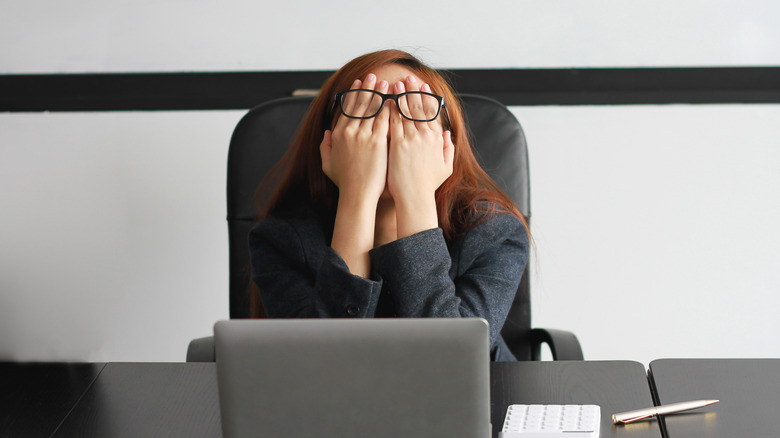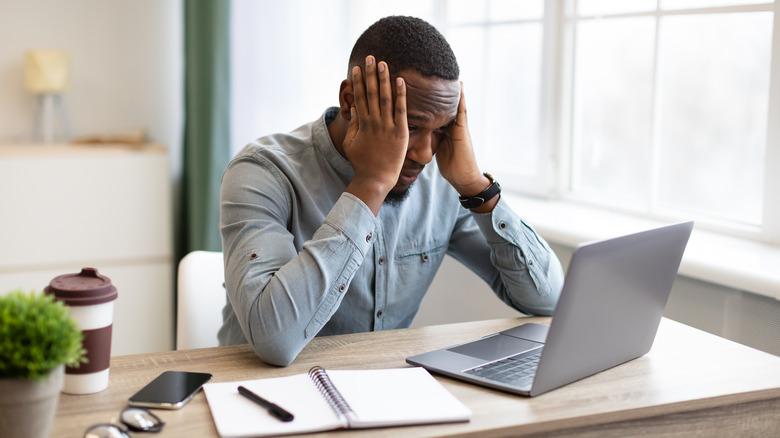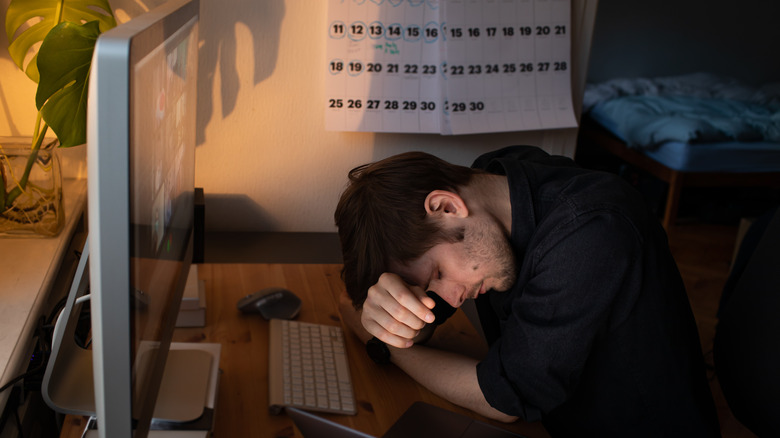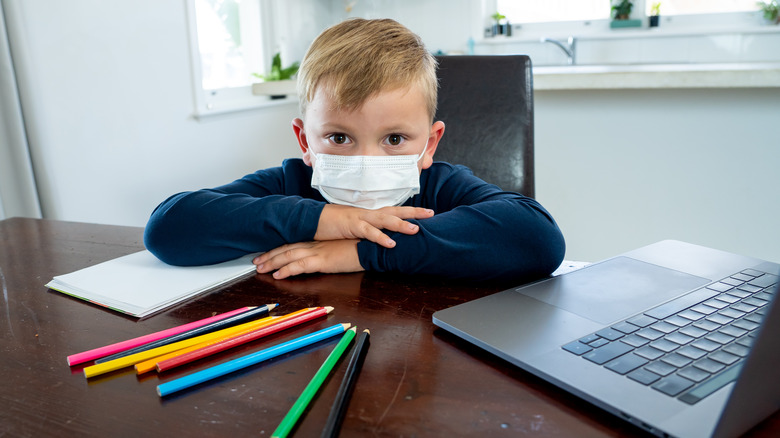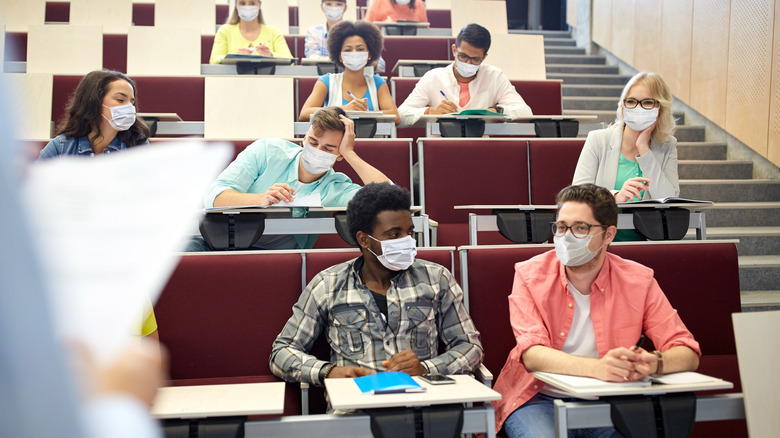Two Years Later, What Do We Know About Pandemic Burnout And Fatigue?
Trigger warning: The following article contains language regarding mental health issues, addiction, drug use, and sensitive issues.
Looking back at March 2020 comes with a certain twinge for most, if not all, of us. The world as we knew it changed in what felt like a blink of an eye, and so many of us went from in-person office settings, drinks with friends after work, and business jackets, to working from the couch, constantly wearing sweatpants, and only seeing our friends via FaceTime. What many thought would be a two week lockdown has turned into a pandemic two years in the making, and with variants and surges, COVID-19 doesn't look like it's going anywhere.
Some would tell you that working from home felt like a dream at first — watching "Tiger King," making sourdough, and rolling out of bed to put on a fresh set of pajamas for work felt like our childhood manifestations coming true. But when we hit the six month mark, then a year, then a year and a half, and now two — we're all feeling the pandemic take its toll. Scientists and researchers alike now have an understanding of pandemic burnout and fatigue, and to say that it's rampant among people of all genders, ages, and socio-economic statuses is an understatement. Here's what we know, and what you can do to take care of yourself amid an ongoing pandemic.
Don't let the doubters fool you -- COVID fatigue is real
If you've ever been told by a spouse, friend, coworker, or boss that COVID fatigue isn't real, promptly tell them they're wrong. Pandemic fatigue is 100% a hurdle that we're all facing. If you don't want to take our word for it, how about the World Health Organization's? Per Healthline, the WHO categorizes pandemic fatigue as a feeling of "demotivated" energy and overwhelming exhaustion. The organization also emphasized that feeling fatigued due to the pandemic is "completely natural." As they described it, our instincts of survival came to the forefront when the pandemic started, as we were all facing unpredictable circumstances. But as the pandemic has continued to drag on, our ability to relax amid an instinctual fight or flight response has waned, causing many of us to feel drained.
Dr. Rajvinder Samra, a psychologist, supported this information during an interview with The Guardian. As she described, "You may feel excessively tired, drained, more easily frustrated or fatigued. ... That is the body trying to adapt and protect us. But ultimately, it's not really good for our jobs or ourselves."
Pandemic fatigue isn't the same as pandemic burnout
Before we continue, it's important that we distinguish what the main differences are between pandemic fatigue and pandemic burnout. Dr. Paul Nestadt, a professor of psychiatry and behavioral sciences at Johns Hopkins University, told Everyday Health that pandemic fatigue is the result of the ongoing exhaustion that so many of us are feeling. Nestadt explained that because "we understand there's no definitive end" to the pandemic as of yet, fatigue is "widespread." Signs of pandemic fatigue can be tiredness, irritability, increased stress, and more.
Here's where the difference kicks in — pandemic fatigue can turn into pandemic burnout, and this is the transition that all of us need to be aware of. Amelia Nagoski, the co-author of "Burnout: The Secret to Unlocking the Stress Cycle," told Oprah Daily that burnout "manifests as illness" and can take "a long time to recover from." We're not talking about a weekend trip or day off work — but weeks, if not months, of recouping. The kicker is to intervene when pandemic fatigue is setting in. This, of course, can be a challenge — but don't worry, we're here to help.
What are the common warning signs of pandemic burnout?
Now that you know the difference between pandemic fatigue and pandemic burnout, you might be paranoid that you have pandemic burnout as opposed to its less severe cousin, fatigue. While we can't diagnose you ourselves, we can lay out three of the telltale signs of burnout.
According to the International Classification of Diseases (ICD-11), burnout — especially at work — is a syndrome caused by "stress that has not been successfully managed" (via ADP). The pandemic has only increased the frequency and severity of burnout, which comes as a shock to no one. So if you think you are suffering from burnout, or simply want to be on the lookout for symptoms, here's what you need to look out for: Feeling exhausted or completely depleted of energy; difficulty engaging mentally or feeling pessimistic all the time; and finally, decreased work productivity.
According to the ICD, this is the trifecta of burnout signs, so it's important to not only be aware of them, but to actively take care of yourself and your own well-being so these three symptoms don't manifest in the first place.
COVID burnout can change your emotional resilience and exhaustion levels
If you are suffering from COVID-19 burnout, you could be subject to changes in your emotional resilience, as well as your ability to combat exhaustion. Emma Kavanagh, a psychologist who focuses on how we cope with devastation and its results, shared with The New Statesman that another side-effect of the pandemic she's noticed is something called "psychological hibernation" — in other words, people aren't operating at the level they once used to, and it's starting to have major impacts. "Where there's not many sounds or people or different experiences, it doesn't require the brain to work at quite the same level," Kavanagh said. "So what you find is that people felt emotionally like everything had just been dialed back. It looks a lot like burnout, symptom wise."
Kavanagh further explained that this burnout parallel has resulted in many people "struggling" to reacclimatize to social situations, workplace environments, and circumstances similar to pre-pandemic life. She said that due to our lowered senses, our emotional resilience is taking a hit. "We are now struggling to adapt to higher levels of stimulus," she said. "[Lockdown is] not a system that was designed to last for 18 months."
Why are more people experiencing addiction amid the pandemic? It could be because of burnout
A scroll through TikTok on any given day during the pandemic can show a lot of day drinking, "work" breaks that look like happy hour on the balcony, and vodka in water bottles to make afternoon walks more exciting. While there is a certain level of humor to some of this social media content, habits amid the pandemic have increased for many into full fledged addictions, and according to Healthline, this isn't a coincidence. Mental health professionals attest that due to health concerns, monetary stresses, quarantine, and more struggles linked to COVID-19, a number of people have developed addictions and/or disordered eating. To say that the stats are alarming is an understatement.
In a study published by the Wiley Public Health Emergency Collection, 38% of those who had been diagnosed with an eating disorder before the pandemic started reported that their disordered habits had gotten more severe. Increases in anxiety and depression were also noted by Healthline as pandemic-related disorders. So what can you do to help combat these dangerous habits? The researchers in the aforementioned study suggest that outdoor activities, meditation and breathing exercises, and daily journal entries can help.
Burnout can lead to serious health problems
We've established that pandemic burnout can manifest as exhaustion, inability to work, addiction, and more, but perhaps some of the scariest implications of pandemic burnout come in the form of serious health problems. In a study entitled "Physical, psychological and occupational consequences of job burnout," found in the National Library of Medicine, researchers discovered that burnout is a "significant predictor" of the following: type 2 diabetes, musculoskeletal pain, gastrointestinal problems, respiratory issues, coronary heart disease, increased mortality for people 45 and younger, and (unfortunately) a slew of other problems. The study also found that issues including insomnia, medication abuse, and mental health hospitalization can be tied to burnout.
So what do medical professionals have to say about such severe burnout-linked health problems? Dr. Helen Wall, a general practitioner, told Stylist that stress can be the culprit for a number of these issues, and the pandemic has only increased severity. "The stress of lockdown, the stress of being isolated from each other and the worries and fears everybody's had through the pandemic — we definitely know all of that produces an array of hormones," she said. "It's not a myth when people say, 'I've been a bit stressed, and so I've gotten ill' — that is an actual thing that happens."
Elementary-aged children have felt alarming impacts of the pandemic
We've discussed, largely, pandemic fatigue and burnout impacting those that are workforce aged, but don't think that working adults are the only age group significantly impacted by the pandemic. Children, according to the Kaiser Family Foundation, "may be uniquely impacted by the pandemic," as many of them have suffered social, academic, and parental losses. Children have all the emotional capacities of full-grown adults, but may not possess the vocabulary needed to express what they're feeling. This has certainly resulted in a one-two-punch experience, as children across the world have lost vital experiences to the pandemic that they will never get back.
When discussing pandemic fatigue and burnout among children, Kaiser put forth that dramatically changed schedules, inability to access school and friends, housing insecurities, and food challenges have been to blame. What's more is that the use of mental health resources available to children has skyrocketed amid the pandemic, with more and more underaged people showing signs of anxiety, depression, and stress. It's been estimated that more than 43,000 children have suffered the loss of a parent due to the pandemic, increasing fatigue and burnout even more.
College students experienced pandemic burnout at a terrifying rate
Working adults have experienced fatigue and burnout, as have children — so where do college students fall? According to Healthline, college students may be the group suffering the most, as a record breaking number of reports detailing anxiety, depression, and other mental health disorders have been filed amid the pandemic. Dr. Bernadette Melnyk of Ohio State University surveyed students in August 2020, asking them to report on their mental well-being. In August 2021, when she checked back in with the surveyed students, the results were astounding.
"In August 2020 ... student burnout was at 40%. In April 2021, it was 71%," Melnyk reported, per Healthline. "The survey really brought students' continued mental health struggles to light, and it is crucial that we arm students with the resilience, cognitive-behavioral skills and coping skills that we know are protective against mental health disorders," she continued. Melnyk's study additionally found that anxiety among college students increased from 39 to 43%, and depression from 24 to 28%. She also found that habits such as smoking, unhealthy eating, and drinking were on the rise, attributed to student burnout, anxiety, and academic concerns amid the pandemic.
Some professions are more likely to have experienced burnout during the pandemic
Those of us who were fortunate enough to have careers that transferred to working from home without much of a hiccup should consider ourselves lucky — grocery store workers, teachers, medical professionals, restaurateurs, and more were not in the same boat. While many of us, regardless of career, have felt the burnout impacts of the pandemic, research shows that some professions are more susceptible to fatigue, exhaustion, and other severe stressors caused by the pandemic. Unsurprisingly, healthcare workers top the list. Per Frontier, healthcare workers' proximity to the actual virus, coupled with losing patients, witnessing heartbreak, physical stress, mental exhaustion, and more have put so many workers in compromised states. The American Psychological Association further explained that caretakers are also highly prone to burnout, as "it's been so much harder to keep up with the demands during a pandemic," according to Christina Maslach, PhD.
Another professional track that has proven to be highly susceptible to the burnout impacts of COVID-19 is that of university professors. As per Nature, professors have had to not only endure the obvious stressors of the pandemic, but have dealt with campus closures, lay-offs, student vulnerability, among other pressing issues.
Employees are afraid to ask for help with burnout
If we haven't established the frequency and severity of pandemic fatigue and burnout by this point, we've done something wrong. Clearly, so many people are feeling the impacts of the prolonged pandemic, and it seems to be a reality that we're all at least partially aware of. However, Psychiatric Times reported that despite the ongoing strife that so many of us are facing, a number of employees are nervous — or downright afraid — to talk to their employers about their struggles for fear of retribution. Clearly, something is wrong with this picture.
Psychiatric Times found that in 2019, 91% of employees thought their company and bosses should express more care about mental health, but a mere 26% revealed that they pursued some type of therapy or treatment. What's more is that 20% of that 91% (stay with us) reported that they were fearful that their professional track would be negatively harmed as a result of seeking help. While some companies have made it a point to focus on mental health resources (we'll get more into that later), it is certainly not the norm. Psychiatric Times suggested that workplace flexibility could be the answer to addressing burnout.
Some employers have started to take notice of burnout
We're aware that these facts about pandemic fatigue and burnout paint a negative picture, so let's take a breather and talk about some companies who are actually changing the narrative surrounding mental health in the workplace. As mentioned before, this is certainly not the norm, but hopefully with time — and these examples — other companies will follow suit. The Washington Post presented a round up of employers who are taking pandemic burnout seriously, and among them are some of the biggest companies in the game. Take Mozilla, for example, the company behind Firefox. Mozilla completely closed shop for a week, calling it "Wellness Week," and the time off took employees through to the end of the Fourth of July weekend. The move capitalized off of the company's "Wellness Day" practice, which no doubt did wonders for employees.
Other companies have followed suit, including PepsiCo, Verizon, and dating app company Bumble. Bumble — a female founded company, we might add — gave employees a week off solely because it was needed. LinkedIn did the same, and Fidelity gave workers five "relief days" they could use at their discretion.
Workplace flexibility can help
As we briefly mentioned previously, workplace flexibility could be the key to helping combat pandemic fatigue and burnout. Many employees have gotten used to the relaxed rules of working from home, and now that returning to at least a hybrid situation is the reality for some, employers could significantly help their workers out by making the workplace as fluid as possible. Dr. Michael P. Leiter, who specializes in psychology and burnout specifically, told the American Psychological Association of workplace flexibility, "Employers could reduce the propensity for burnout, but rigidity will only cause more burnout in workplaces." So take it from a pro — fluidity and ability to dictate one's own work is key.
Furthermore, a study from Gartner found that employers should really take workplace flexibility seriously, as it's now a determining factor for many people both seeking employment and staying in their current positions. The study found that 55% of workers identified workplace flexibility as a factor when considering retention, so to say that it should be a priority is an understatement. Overall, it's clear that we're looking at a much different world post-pandemic, so employers and companies will have to follow suit.
Can 'burnout breaks' help?
So what can you do to stop pandemic fatigue — which just about all of us suffer from — from turning into pandemic burnout? One practice that can be put in place right away and has proven to be effective is taking periodic breaks. Ann Francke, a chief executive, told The Guardian that breaks — coupled with workplace flexibility and employee autonomy — could significantly reduce pandemic fatigue. She also highlighted workplace environments, suggesting that little things can make a big difference. "Little gestures of appreciation and recognition are worth their weight in gold," she said. "They motivate people, they are free — and they can be done immediately by anybody."
Francke went on to say that perhaps an unexpected benefit as a result of the pandemic could be the changing workplace attitude towards mental health — it is something many, if not all of us are struggling with to some degree, and Francke thinks this could change the workplace for the better. "I've spoken to many leaders and they all see the wisdom of protecting staff mental health," she said. "I think the pandemic has shocked us into realizing the value of our mental health — this could actually be a silver lining."
Could magic mushrooms help?
Well, here's a discovery we never saw coming — turns out that some people who have been subjected to extreme pandemic burnout are turning to magic mushrooms for help, and the science behind it is quite surprising. We're not suggesting drug use as a means of treatment, just to be clear, but the subject is worth exploring because as it turns out, it's doctors who are taking up the surprising method. As aforementioned, doctors and healthcare workers have taken such a beating during the pandemic, and according to Insider, the "psychoactive component" of magic mushroom — psilocybin — is helping some of them fight pandemic burnout and depression.
Now here's the catch: The use of magic mushrooms as treatment hasn't been studied at all, and the legality of the option has sparked some controversy — this is to say that this option is certainly not for everyone. Will magic mushrooms help? Time will certainly tell.
Given that we're two years into this thing, what we know about pandemic fatigue and burnout is far greater than what we thought it to be previously. So in order to take care of yourself and preserve that little piece of sanity that we're all holding onto, go take a walk, drink some water, and make sure you're getting some sleep. You're a essentially houseplant with more complicated emotions, so make sure you're taking care of your basic well-being. We'll get through this together.



